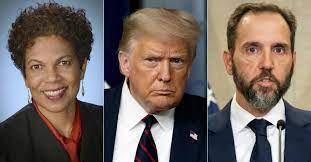Why Trump’s Appeals to U.S. Supreme Court re: Immunity from Prosecution Will Fail

U.S. District Judge Tanya Chutkan, who was randomly assigned to the federal criminal case accusing Donald Trump of conspiring to illegally overturn the 2020 election, has ruled that “presidents are not kings,” and therefore Trump had no special privilege to commit crimes with impunity.
Now, special prosecutor Jack Smith has asked the U.S. Supreme Court to make a ruling here, even though such a request “leap-frogs” the case over an appellate court.
Former federal prosecutor and legal analysts Glenn Kirscher makes a point that, IMO, explains why Trump’s assertion is, in fact, absurd: If the Supreme Court agrees with Trump, they are making the statement that they are not a co-equal branch of government as specified in the U.S. Constitution. If Trump were to be reelected, he could, if he wished, simply disband the high court.
This is the type of political criminality that defines so-called “banana republics,” i.e., these countries’ executives somehow attain absolute power, and then wield that power to pound their judiciaries and legislative bodies (not to mention political opponents) into insignificance. Regardless of how conservative the nine-judge panel may be, they will not vote to set aside the Constitution so as to catapult Donald Trump to a position of leadership enjoyed by Kim Jong Un and the world’s other sociopathic dictators.

Want to make a bet on your last assumption — I wouldn’t.